Isla Kilpatrick-Screaton, a 2-year-old girl from Leicester, England, has been battling a rare aging disease called “Benjamin Button disease” or “Progeria.”
She has mandibuloacral dysplasia that causes her bodily cells to age far more quickly.
The National Organization for Rare Disorders says only 40 such cases have even been reported so far.
According to her DNA tests, Isla carries a specific genetic mutation, which was never seen in any other sufferers, making the condition first of its kind.
Isla, who is also battling respiratory and heart issues, now faces a very uncertain future.
Isla’s mother, Stacey Kilpatrick-Screaton had a normal pregnancy. However, the delivery was dramatic because the baby nearly suffocated.
Kilpatrick-Screaton said, “Once she was born and [they] cut off the umbilical cord, she couldn’t keep her oxygen level above 60 percent when it needed to be 90 percent. The nurses were trying to keep her airways open for what felt like hours. We expected to be able to see her but she was taken to neonatal intensive care.”
“We nearly lost her,” she added. “She was fighting against everything they were trying to do.”
Doctors had to put Isla in a medically induced coma for the first five days. And a month later, the doctors said she was well enough to go home. However, six days after discharge, her condition got worse.
Isla’s mother said, “We had to ring an ambulance after six days because she started choking, spluttering and turning blue when we were bottle-feeding her. One of us would do CPR while the other held the phone. In the hospital, they managed to clear her airways and she spent another two weeks there.”
After undergoing a number of tests, Isla was diagnosed with mandibuloacral dysplasia in October 2017. The girl’s parents were asked to know about the condition online because doctors failed to explain the condition.
Kilpatrick-Screaton said, “We were lightheartedly told to ‘get Googling.’”
Her father, Kyle, said, “We’re told her condition isn’t life-limiting but we just don’t know for sure as her case is so unique. We have been left in the dark somewhat. There’s not really any support available so we just take it day by day.” Isle’s parents are speaking about raising awareness about the condition so people can learn about the disease. Kyle said, “I just really want to raise awareness of the disease to help Isla and other children that might have it in the future.”























